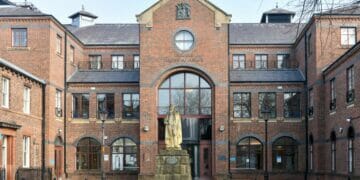
A man who loved Cumbria so much, he made it his home, has died at the age of 79.
David Hurford had fulfilled his dream of living somewhere in Cumbria when he moved to Maidenhill, Penrith, with his wife, Christine, 13 years ago, after leaving London behind.
The couple had spent walking holidays in the area for more than 20 years before choosing Penrith as their favourite town.
David joined Penrith and District Camera Club, as photography was a great love from his early years — both darkroom and later, digital.
His first photo was a close up of the Queen Mother when she was visiting his school in Dulwich, South London.
After many years teaching English in secondary schools, he ended his working life in a shop specialising in antique cameras.
In London, as chairman of the Federation of South London Photographic Clubs he spent hours visiting all the clubs, encouraging when times were tough, which paid off, as they are now flourishing.
In Penrith, he entered the competitions, especially mono print competitions, and enjoyed the outings and weekends away.
In his eloquent and measured style, he helped as vice-chairman for some years and gave talks on early cameras and equipment and told stories of some of the early famous photographers.
With Christine, they made many good friends in Penrith.
Here, people knew that David had for many years suffered with major leg problems, which meant that walking was tiring and, later, difficult.
However, they did not know so much of his former life as a teacher in Bolobo, Congo — now Zaire — with the Baprtist Missionary Society; his years as a magistrate in Woolwich and Greenwich and his 25 years with the talking newspaper for the blind and partially sighted, where he did the recording or reading of the newspaper in Lewisham.
Early on in their marriage, the couple decided to try to climb all the Wainwrights. Even after leg surgery in 1990 and with a splint on one leg (later both legs), David managed to get up 207 out of the 214.
Crinkle Crags was to have been the last one, to be followed by a celebration, but more leg problems and surgery put paid to that.
David was quick-witted and good company and had a great love of the English language. He was skilled at crosswords and word puzzles, which kept his mind sharp and active.
He collected fossil trilobites and in this last few years, First World War medals, researching the history of the recipients.
He died suddenly at home and will be missed by many who had got to know him as well as wife Christine and relations from several parts of the country.































